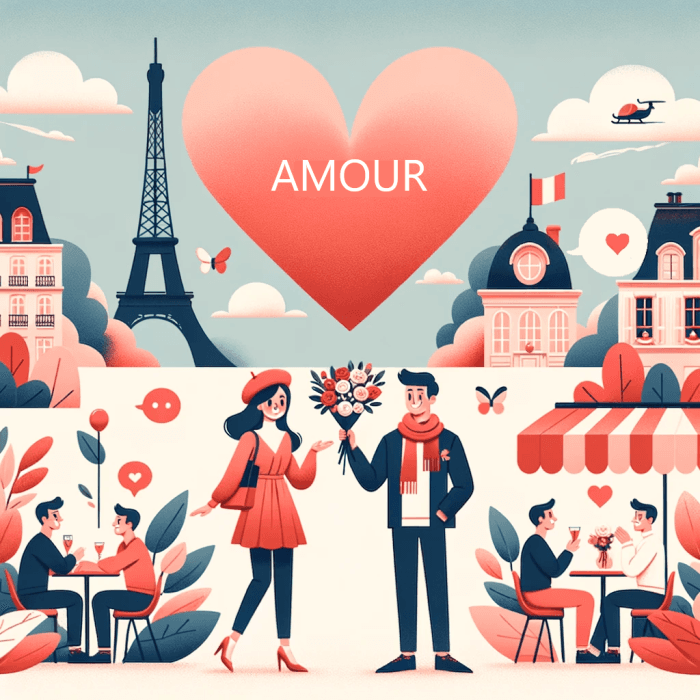
Explore the Favourite Love Expressions of the French

February 1, 2024
2/1/2024
One of the most poetic and exciting spheres of every language is the language of love. It is universal, but each language adds its own nuance. In French, we have a multitude of expressions that capture the wide variety of feelings and emotional states one can experience when falling in love. Today, we will discover some of these vibrant expressions and how they are used in everyday communication in French. Here's a tour of the most beautiful expressions of love in French!
Avoir le coup de foudre
The phrase "avoir le coup de foudre" or literally "to have a thunderbolt" does not define a change in weather, no. This particular French expression rather discusses a feeling of love that strikes us suddenly and intensely, just like a thunderbolt. The English equivalent would probably be "love at first sight". For example, you could say:
"Dès que nos regards se sont croisés au parc, j'ai eu le coup de foudre".
Avoir un cœur d’artichaut
If you're a person who falls in love quickly, you can use the phrase "avoir un cœur d’artichaut". It's a fun way to refer to the tendency to easily fall in love, just like an artichoke has many leaves that can be peeled off one by one. In English, the closest equivalent would be "wearing your heart on your sleeve". An example of how to use this expression?
Mon amie Marie a un coeur d'artichaut, elle s'éprend sans cesse d'un nouvel amour!
Déclarer sa flamme
If a French person says, "Je vais déclarer ma flamme", it means that he or she is about to openly express his or her love for someone. While in English we more simply say "to declare one’s love", in French we add a passionate dimension with "flame". Be romantic like a French person:
Après des semaines de secret, Pierre a finalement décidé de lui déclarer sa flamme pendant une balade au clair de lune.
Avoir le cœur qui bat la chamade
As for the expression "avoir le cœur qui bat la chamade", it's a poetic phrase that describes those moments when your heart beats so hard and fast, usually because you're excited or nervous, often in the presence of the person you love. Here is an example:
"Chaque fois que je vois Julien, j'ai le coeur qui bat la chamade."
Le saviez-vous ?
The expression "avoir le cœur qui bat la chamade" comes from the Italian word "chiaramente", which means "clearly". This dates back to a time when, in times of war, "battre la chamade" meant to surrender, by striking loudly and clearly on a drum or a bell. Curious, isn't it?
Trouver son âme sœur
Une âme sœur n'est pas quelqu'un qui nous donne ce que nous manquons ; c'est quelqu'un qui nous aide à être ce que nous sommes. - René Char
You may have already heard the phrase "âme sœur". In French, it's exactly the same - meeting your "âme sœur" means that you have found a person with whom you share a deep and unique connection. Destiny seems to have brought you together, and your bond goes beyond what words can describe. A use-case could be:
J'ai rencontré mon âme sœur lors d'un voyage en France; nous avons vite réalisé que nous partagions les mêmes valeurs et passions dans la vie.
Avoir des papillons dans le ventre

The expression "avoir des papillons dans le ventre" talks about that strange but pleasant sensation of nervousness usually felt at the beginning of a new romantic relationship. As if an army of little butterflies was flying in your stomach! In English, it's quite similar: "to have butterflies in one's stomach". Example:
Chaque fois que je suis sur le point de retrouver Mathieu, j'ai des papillons dans le ventre.
Être fleur bleue
Well, if someone describes you as being "fleur bleue", it means that they find you romantic, often from an idealistic or naive point of view. It's as if you had a soft and sentimental side, a bit like the characters from the 19th century novels. There is no direct translation in English, but the phrase "hopeless romantic" is pretty close. An example of use:
Charlotte est vraiment fleur bleue, elle rêve encore du prince charmant !
L’amour vache
The term "amour vache" is used to describe a romantic relationship marked by lots of arguments or teasing. It's a stormy love, with ups and downs, but still a strong emotional relationship. In English, you might say of this relationship that it's a "love-hate relationship". For example:
Jean et Louise ont un amour vache, ils se chamaillent souvent, mais ils ne peuvent pas vivre l'un sans l'autre.
Un amour platonique
A "amour platonique" is a romantic feeling that is not linked to physical desire. In fact, it's an intellectual and spiritual affection for another person that doesn't include sexual desires. English speakers also use the same term "platonic love". An example of use could be:
Isabelle et Martin partagent un amour platonique, un respect mutuel et une profonde admiration, sans désir romantique.
Vivre d’amour et d’eau fraîche
The expression "vivre d'amour et d'eau fraîche" is a lovely way to say that we are so in love that we need nothing else to live. It's a bit like saying that love is enough to nourish life. In English, we could say "live on love alone".
Ils ont décidé de partir faire le tour du monde ensemble, vivant d'amour et d'eau fraîche.
Conclusion
In summary, these, French expressions about love are a magnificent sample of the richness and poetry of French. Understanding and integrating these expressions into your daily vocabulary will not only improve your mastery of the language, but also allow you to grasp more deeply the essence of French culture. Use these expressions about love to bring life to your speech, and you'll see, you may impress the French speakers around you! So, ready to fall in love in French?
Nous vous souhaitons un excellent apprentissage du français !

Subscribe to our newsletter
Latest posts
Browse all posts
Subscribe to our newsletter
Stay informed and get a free video

